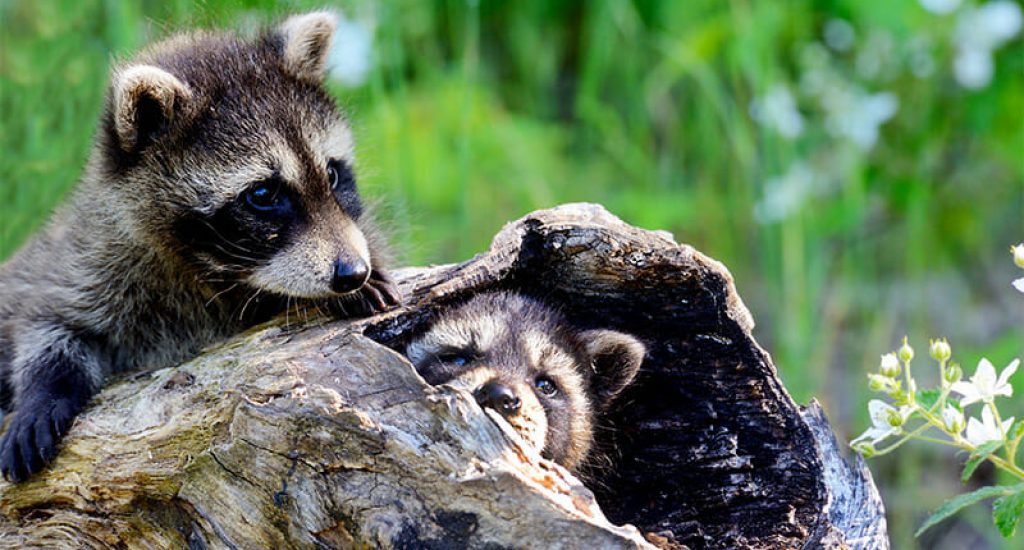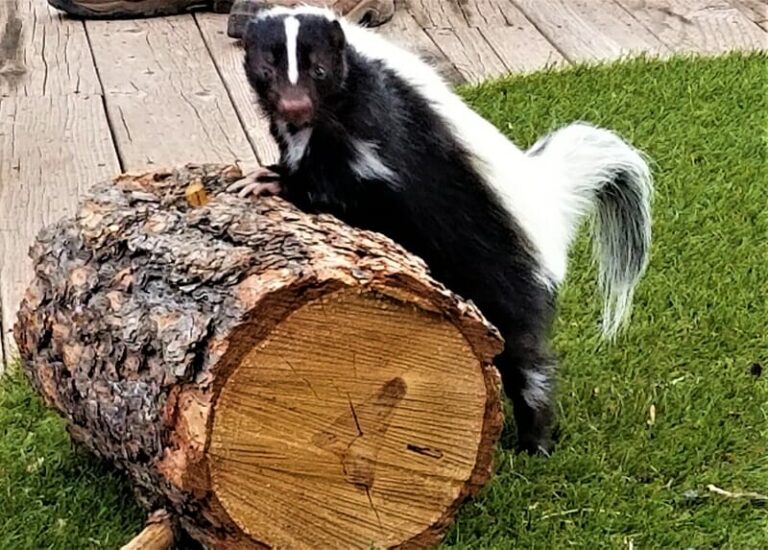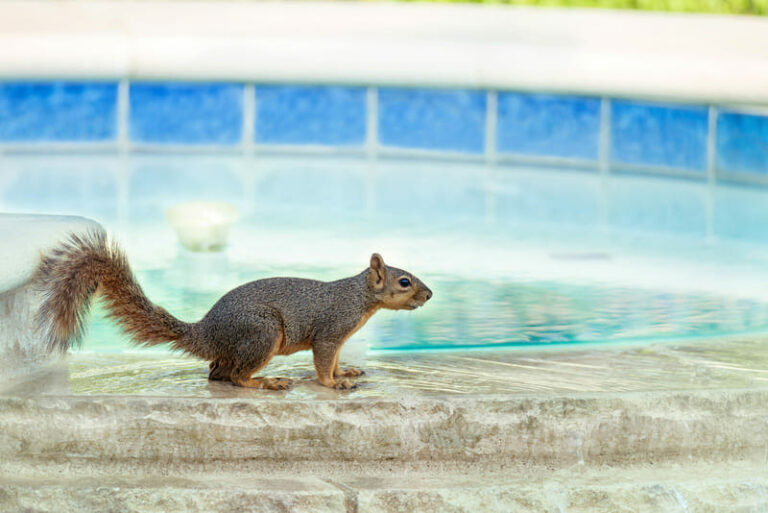Welcome to April! It’s been a chilly one so far, but that won’t stop raccoon baby season from kicking off.
Yes, it’s true!
During the late winter, raccoons mate and have their litters in April or May. We have seen babies born as early as March and as late as June and, if a female raccoon loses her first litter early in the season, a second litter may be born as late as July. However, this is not very common: for raccoons, April is definitely the main baby season!
What does this mean? As soon as March hits, you want to be looking for any signs of a raccoon mother trying to get into a nice and warm space- usually your attic. Nesting materials are readily available, it’s quiet and dark, and the enclosed, elevated area offers protection against predators. In this blog, we’ll show you how to tell if a nursery is under construction in your home and how we can help you proceed with humane raccoon removal!
Mama Raccoon? Are You There?
With some visitors, it’s hard to detect them until they’re already well-established. The good news is that raccoons are a LOT bigger than mice and the signs of their presence are more noticeable. If you observe any of the following, it’s likely time to schedule a humane wildlife removal in Hamilton.
- Strange Noises: You can hear raccoons thumping and rustling overhead and in the walls as they move in and prepare their nests. Trust us, they’re not exactly subtle!
- Visible Entry Points: You will typically find bent siding, damaged soffits/roof vents, dislodged shingles, and other obvious signs of animal entry on the exterior of your home.
- Baby Noises: During the early stages of their lives, newborn raccoons tend to be very vocal. They cry frequently during the day (and unfortunately at night, too).
- Mom Hanging Around: You will frequently see the mother on the property. While her babies are young and helpless, she will not wander too far.
- Garbage Everywhere: Raccoons are called trash pandas for a reason. Prying lids off of garbage cans and scattering the contents everywhere are all signature moves. We recommend that you get a secure container. It won’t make Mama leave, but at least you won’t have to clean up after her.
How Do Mother Raccoons Get Into Your Home?
Many people believe that raccoons usually enter homes through open doors or windows, but this is not true. These animals normally enter a structure through an opening on its exterior. Remember: a raccoon only needs to fit its head through a hole to squeeze its entire body through. A hole, gap, or space with a diameter of at least 3” is a potential entry point.
Roofs are by far the most common entry point for adult raccoons. As most residential roofs are rarely inspected for damage, they will easily tear through loose or damaged shingles to get into the house. Furthermore, there are many spaces and holes on the roof, including chimneys, vents, plumbing mats, and intersections between the roof and soffit.
The roof is the most likely entry point for raccoons, but this doesn’t exclude all holes, gaps, and spaces along the home’s exterior. Raccoons have strong claws, sharp teeth, and are highly dextrous. When they combine these advantages with their natural intelligence, they can spot weaknesses in the home’s structure and exploit them to get in.
How Long Will the Family Hang Around After Raccoon Baby Season?
Female raccoons give birth after a 63-day gestation period. The average litter size is three to five babies, although they can be as small as one or large as eight. Baby raccoons generally won’t start moving around and exploring until they’re at least three months old. Before that time, they’ll be tucked away in their nest while Mom goes out looking for food.
Once they hit the three-month mark, that’s when you’ll see them starting to forage on their own. They’ll wander throughout the attic space and even follow Mom outdoors. That’s when you can breathe easy, right?
Not quite.
Raccoon baby season may be over, but that doesn’t mean the family has terminated its tenancy. They’ve found a safe, comfortable, and warm place to call home, and they’ll definitely be coming back. Since Mama was living there prior to giving birth, she won’t be wanting to clear out any time soon.
Speaking of which, another reason why you want to move the babies ASAP is that if you don’t, the females will return next year to have their own litters. So will the female offspring of these future families! Don’t get stuck with an endless succession of tenants because believe us, it will be endless!
Do Raccoons REALLY Need to be Evicted From Your Hamilton Home?
Yes, they’re cute and all, but you really don’t want raccoons to stay.
Leaving Mom and babies unattended in your attic for any length of time will result in substantial damage, namely:
- A contaminated attic. It doesn’t take long for it to be filled with nesting materials and faeces as well as the smell of urine.
- Damage to air ducts, electrical systems, structural beams, etc.
- Torn-up insulation in the walls (now doubling as nesting material)
When a raccoon family moves in, it can cost thousands of dollars to repair and remediate the signs of their presence. Homeowners should therefore arrange to quickly and humanely evict these uninvited guests as soon as possible.
Here’s What You DON’T Want to Do
Many homeowners who aren’t aware that Mom has given birth will wait for her to leave the property before sealing all known entry points. Don’t do it! Although this measure will prevent her from getting back in, the baby raccoons will starve to death in your attic space.
You also don’t want to set traps or hire a company to do it for you. Trapping is rarely humane, and there are better ways to remove the animals so they can set up another den elsewhere. Instead, contact a company that knows how to carry out humane wildlife removal in Hamilton.
How Do You Humanely Evict Raccoons?
When you contact Bad Company Wildlife Eviction, we inspect your home from top to bottom, looking for two things:
- Confirmation that animals are present.
- Entry points that they may have used.
When we find baby raccoons, we put them into a heated, insulated box near a one-way door. As soon as the mother determines that it is safe to do so, she typically returns and moves her babies one by one to their new homes.
Here’s what a heated box looks like:
After all entry points are identified, our technicians install one-way exits that allow any raccoons inside the property to leave but not get back in. Weak points are sealed by screening and caulking to prevent Mom or babies from re-entering. Once your evicted tenants have left the property, we will remove these one-way exits and permanently seal the openings.
How Can You Keep Raccoons From Coming Back?
Before we leave, we’ll provide you with a list of recommendations for securing your home against future visitors. Evicting one raccoon family doesn’t mean you won’t have problems in the future, unless you take preventive measures now.
- Remove food and water sources that might attract raccoons. This includes unsecured garbage bins, pet food and water dishes, and leaky hose faucets. If you have a garage, shed, or another outbuilding, follow the same procedure.
- If raccoons are looking for shelter, they may use branches, shrubs, or vines to enter your home. Trim or remove all the greenery around your house to remove these natural access points.
- Keep wildlife from getting inside your chimney by installing a chimney cap. This is a common entry point for raccoons in particular.
We can conduct a thorough post-eviction inspection of your home to determine if it’s fortified against any more masked invaders and help you develop a plan for keeping your home visitor-free in the future.
How Much Does It Cost to Evict Raccoons?
Since each eviction requirement varies, it is impossible to provide a price before your home is inspected. Once you contact us about your unwanted houseguests, we will send a wildlife eviction specialist to inspect your home and identify entry and exit points. Next, we will explain our eviction process and give you an estimate so you can decide if you’d like to proceed.
Got Raccoons? Talk to Us About Humane Wildlife Removal in Hamilton, Burlington, Oakville (and Other Places)!
As you probably guessed, we love animals at Bad Company Wildlife Eviction. We especially love baby raccoons, even though raccoon baby season can be challenging for our clients! All of our evictions are carried out in a manner that minimizes stress to the animals while protecting your home against future visits. When you call us, we’ll come up with a plan that’s a win-win for everyone. To learn more or schedule a no-obligation inspection, call 1-855-880-9860 or contact us online.




